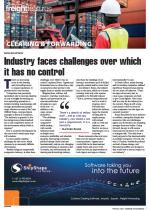An increasing willingness and enthusiasm to implement technological solutions is changing the face of the clearing and forwarding industry.According to Michael Henning, sales and general manager at Easy Clear, there is still, however, some reluctance from trade to share information for fear of diluting the competitive advantage. “Add to that public sector fragmentation and disparate systems that do not talk to each other, and departments that will not talk to one another within the same sector, and one is holding back real change,” he says. “Couple that with some of the policy changes we are seeing on the continent that should be enabling change but are rather encouraging bureaucracy, and we have some serious challenges on our hands.”But, he says, considering Africa’s resilience and innovative spirit these challenges are not insurmountable.“There is recognition that technology is replacing the user for the mundane, time-consuming and repetitive data capture tasks. It is being implemented to reduce risk and secure transactions between parties in the supply chain. Where a single platform is not possible, integration between systems makes the above possible through the deployment of machine learning artificial intelligence (AI), intelligent algorithms, and clever web services and APIs.”He explains that the sharing of data translates into a more streamlined and cost-effective supply chain with gains for all parties, and more importantly, the end consumer. “This is not new, but rather the application of the technology within the South African and continental landscape is ongoing and the process of enlightening the industry, resulting in the adoption of technology, is the focus at present.”He says the benefits of technology are endless. “Besides the reduction in paperwork that needs to be generated – and that in itself is a huge win for both the industry and more importantly the environment – it is beyond me that many revenue authorities and OGAs still insist on a paper document trail when we are in the midst of a digital revolution. The more data that can be shared between trade and the revenue authorities and other relevant parties in the supply chain that have an impact on the movement of cargo, the greater the impact on this sector.”He says in the face of this technological transformation, investment in people is critical. “Upskilling of staff is a trend we are seeing across the industry. There is more training taking place and there is a realisation that investment in existing human capital is worth making – as well as the investment in technology to adapt to a changing commercial environment.”

